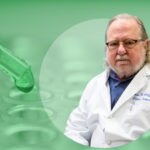BBVA Foundation Frontiers of Knowledge prize awarded to James Allison, pioneer of immunotherapy against cancer
U.S. researcher James P. Allison has won the BBVA Foundation’s Frontiers of Knowledge award for developing the first highly effective immunotherapy treatment against cancer. Allison´s work has enabled the development of a new class of drugs that employ the immune system to fight cancer, and which have already provided clinical benefits to thousands of patients.

Immunotherapy works by mobilizing the system’s natural defenses to combat and eliminate specific cancer cells. For decades, various attempts had been made to employ this strategy, without success until Allison, a native of Alice, Texas, and his team stepped in. In the mid-1990s, they discovered a key mechanism in the functioning of the immune system cells responsible for fighting tumor cells: the existence of a series of molecules displayed on the surface of the immune system’s T-cells, which normally act as a brake on this function, to prevent them from turning against the organism itself, under normal circumstances.
The next step was what Robin Lovell-Badge of the Francis Crick Institute, a member of the Frontiers of Knowledge jury, describes as "taking a foot off the brake" of the immune system. The T cells can then act unhindered against the cancer cells that are their target.
Allison’s work led to the approval by the U.S. Food and Drug Agency of the first anti-cancer drug that works by activating the immune system, for the metastatic melanoma indication. The treatment would exceed all expectations, with around 20% of patients still living ten years later.
Several drugs based on Allison’s principle have since been approved, in an effort to boost the percentage of melanoma patients who can benefit from immunotherapy. This line of treatment has also proved effective against cancers of the lung, kidney, bladder, head and neck.
We don’t tackle the cancer directly, we get the immune system to attack it"
Allison recalls how it took a while for the scientific community to accept his discovery. “This skepticism was a reaction to the excess optimism of the early days of immunotherapy. At the start of the 1960s, people started talking about a new system destroying cancer, but the fact is that it only worked in mice. What happened, I think, is that people rushed in to do things without really understanding the underlying mechanism. They didn’t realize that there are these negative signals built into the immune system, which are there to protect us. There were a lot of failures and people just gave up, insisting it was all hype.”
The good results of clinical trials in humans, initiated in 2001, not only proved Allison right, but also inspired many other researchers to start searching for new immune system brakes or signals. Immunotherapy is today one of the most active research fields in oncology.
Among its advantages is that the response is lasting and may even lead, in some patients, to remission of the tumor, because the immune system will recognize the cancer cells if they reappear. Also, as Allison points out, “we don’t tackle the cancer directly, we get the immune system to attack it,” meaning immunotherapy can be effective against multiple tumors. A third advantage is that the treatments generally have fewer side effects.
Allison, however, is the first to warn that immunotherapy is not a definitive solution: “We’re not going to be able to cure all cancers,” he admits. “But I think that in the future, immunotherapy will be a part of all cancer treatments, in combination with chemotherapy or radiation. I am optimistic that we will learn the right things to put together to cure a majority of patients, maybe even reaching from 60% or 90% of cases in some kinds of cancers.”
A personal interest in cancer
Allison defines himself as a basic researcher, or at least that’s how he started out: “I had a personal interest in cancer, because I lost my mother when I was a small child, and later my brother and two of my uncles. But I first wanted to figure out how T cells worked, so I could maybe apply the lessons of this basic research to come up with a cancer therapy. I think you first have to know basic science. Without that fundamental biology you do not have a rational basis for treating cancer. I always had possible cancer applications in the back of my head, but the priority has to be to do the best science you can, not necessarily with a specific goal in mind. That’s what I always tell my students."
Despite this, Allison has had the rare privilege of meeting people who have benefited directly from his work: “One of the greatest moments of my life was seeing a woman who had been told she was going to be dead in a few months, and over 15 years later she is still alive and has two children. That motivates me to do all I can to get these therapies to work better. It’s pretty rare for a basic scientist to get to see the application of their findings. I was lucky enough to have that experience.”